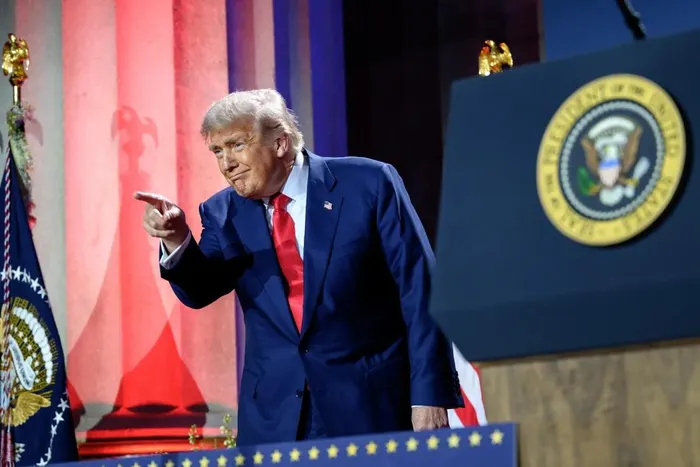Targeting BRICS Through South Africa: H.R. 2633 as Washington’s Neocolonial Weapon

H.R. 2633, introduced by pro-Israel Republicans, threatens South Africa's sovereignty under the guise of protecting US interests. This proposed law aims to punish South Africa for its foreign policy choices, particularly its ties with BRICS and solidarity with Palestine.
Image: The White House
In a move saturated with Cold War paranoia and neocolonial ambition, the United States Congress has introduced H.R. 2633. The US-South Africa Bilateral Relations Review Act of 2025 is a proposed law, tabled by pro-Israel Republicans and neoconservative hawks. It demands a review of South Africa’s foreign policy alignments and opens the door to potential sanctions. It presents itself as a defence of US national interests. In reality, it formalises the soft coup long engineered through think tanks, donor-controlled civil society, and ideological capture.
This bill aims to punish South Africa for exercising sovereign foreign policy. It targets the country’s engagement with BRICS, its solidarity with Palestine, and its economic partnerships with China and Russia. The language of the bill is couched in concern for democracy, transparency, and global security. Beneath the euphemisms lies a clear threat. Submit to US hegemony or face economic, political and diplomatic consequences.
The legislation condemns South Africa for hosting Hamas leadership, criticising Israel’s ongoing war on Gaza, participating in naval exercises with Russia, and collaborating with Chinese educational and infrastructure institutions. It also denounces symbolic acts of solidarity, such as the proposed renaming of a Johannesburg street to Leila Khaled Drive. These actions are portrayed as evidence of extremism and a threat to US national security. But none of them breach international law. All fall within South Africa’s sovereign right to choose its own diplomatic and ideological path.
The framing of these engagements as hostile or unlawful exposes the imperial mindset. The bill does not engage diplomacy. It attempts to control it. It insists that any relationship not sanctioned by Washington is a betrayal. In this worldview, sovereignty becomes criminal when it steps outside the coordinates of US foreign policy.
H.R. 2633 also rehashes long-standing tropes of African dysfunction. South Africa’s domestic crises, such as energy instability, logistical failures, and public health breakdowns, are mobilised not to offer support but to justify external management. It portrays the country as a failing state, incapable of self-governance. This is the same colonial playbook repackaged for a new era. Pathologise the state, delegitimise the ruling party, and prepare the ideological ground for intervention.
The bill proposes the use of Global Magnitsky sanctions against ANC officials. It instructs the US president to compile a list of individuals for punitive action. The objective is not justice. It is regime reengineering. It is a calculated effort to undermine the ANC, isolate South Africa internationally, and signal to other BRICS-aligned states that deviation from the Western order will be met with force.
The ANC, once valorised by the US political establishment during the anti-apartheid era, is now rebranded as extremist. This transformation is not accidental. It follows a familiar trajectory. Movements are embraced only when they conform to neoliberal doctrine. The moment they depart from Washington’s orbit, whether through ties to BRICS, calls for land redistribution, or critiques of Israeli settler colonialism, they are recast as dangerous and illegitimate.
Even symbolic resistance is now treated as a provocation. That a US congressional bill concerns itself with the printing of Leila Khaled’s name on letterheads demonstrates the ideological insecurity gripping the American political class. South African solidarity with Palestine is not only opposed. It is pathologised.
What this bill makes clear is that the US is not simply targeting geopolitical alliances. It is targeting African memory, epistemology, and revolutionary thought. It seeks to erase the intellectual and historical ties that link South Africa’s liberation movement with other global struggles against colonialism and imperialism. This is the ideological arm of neocolonialism. It disrupts memory, silences solidarity, and rewrites the terms of acceptable political consciousness.
H.R. 2633 signals a shift from covert containment to legislative assault. US influence in South Africa has long operated through soft power channels, including donor-funded NGOs, embedded journalists, intelligence-linked think tanks, and academic institutions aligned with Western interests. These mechanisms have shaped narratives, stifled dissent, and disciplined political discourse. The bill is a declaration that the containment strategy has evolved into open confrontation.
This transformation is not incidental. It arrives amid a resurgent Trumpist influence in US politics, where empire is no longer masked by liberalism. Whether under Biden or Trump, the posture remains the same. The Global South must be disciplined or destroyed. This is not about diplomacy. It is about dominance.
South Africa now faces a decision. It can continue appeasing external interests and die as a weakened structure devoid of purpose. Or it can reject US interference and reclaim its revolutionary inheritance. This means withdrawing from agreements that entrench dependency. It means dismantling the ecosystem of donor-funded organisations that function as internal colonial managers. It means removing foreign influence from media, academia, and civil society. It means refusing ideological tutelage and reasserting sovereignty across all domains.
The choice is not theoretical. Other African nations have made it. Burkina Faso, Mali, and Niger have expelled French and US military forces, nationalised key sectors, and begun reimagining governance beyond the framework imposed by the West. These are not perfect models. They demonstrate that the process of emancipation is not only necessary. It is possible.
South Africa must take that step. It must align fully with the Global South and deepen strategic partnerships with BRICS+. This is not simply about economics. It is about consciousness. It is about building an international order that respects the dignity, autonomy, and history of African peoples.
The ANC’s role in this moment is critical. It can return to its roots as a liberation movement with a global vision. Or it can allow itself to be used as a manager of Western interests. It cannot do both.
H.R. 2633 is not just an insult. It is a blueprint for recolonisation. It treats African independence as a threat and African resistance as a crime. It offers South Africa a binary. Obedience or punishment.
But Africa has never been defined by binaries imposed from the outside. There is another path. Revolutionary refusal. A future authored by Africans, in conversation with allies across the Global South, free from the moralism and control of a fading empire.
The bill marks the end of diplomatic pretence. Now is the time to kick out the puppeteer and walk boldly into a multipolar world.

H.R. 2633, introduced by pro-Israel Republicans, threatens South Africa's sovereignty under the guise of protecting US interests. This proposed law aims to punish South Africa for its foreign policy choices, particularly its ties with BRICS and solidarity with Palestine.
Image: IOL
* Gillian Schutte is a well-known social justice and race-justice activist and public intellectual.
** The views expressed do not necessarily reflect the views of IOL or Independent Media.